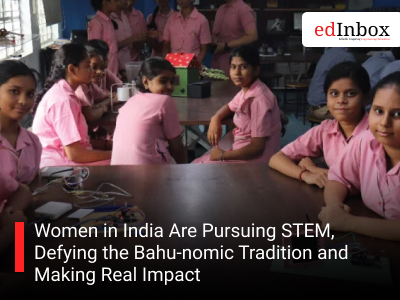Indian women are creating a new history about science, technology, engineering, and mathematics (STEM), silently yet boldly breaking Bahu-nomic culture which is a social and cultural construct that historically defined women as creatures who are primarily at home, are married, have babies and do every labour for the family rather than pursue careers and independence. Today, Indian women are shattering these barriers and actually making a difference in the areas that were considered male-dominat, especially in advanced spheres such as artificial intelligence (AI).
The "Bahu-nomic Tradition": A Modern Demand
The term Bahu-nomic is derived by combining the word Bahu (daughter-in-law) and economic. This is a new trending word used on social media by people who value the efforts of an unpaid househelp (married woman). Most Indian families believed that the ambitions of women other than housework came second. Early marriage, homemaking and subordination were greatly valued by the cultural norms and education was mostly restricted to that which could be regarded as fitting a housewife or educator. As society evolved, the demands increased. Women are now asked to earn as well as take care of the family. Once when women were only bothered for dowry has now transformed into being bullied and forced to manage kids, office, and house, and also split the expenses like electricity bill, EMIs, etc.
India surely changed its behaviour towards women after invaders did their best to promote their culture and beliefs. This deeply ingrained social structure influenced the society, producing a palpable gap in female education and employment, particularly in elite and male-dominated professions like engineering or technology. Women in science, technology, and engineering were exceptional cases, and those who were able to venture into these areas were not received with trust, were looked down upon, and were not supported by the institutions.
Changing Tides: Women seeking STEM in India
Today, the whole scenario is changing fast. India now boasts one of the highest percentages of women STEM graduates globally which is approximately 43% according to the latest surveys. This is a great turn around of a nation that used to be miles behind. The girls of all social and economic backgrounds including rural and semi-urban are now taking up science and mathematics streams in schools with government programs, scholarships and a new attitude towards parents.
Even after this progress, there is a paradox that is critical. It is only 27% of these graduates who are able to work in STEM industries. This is because of work prejudices in the workplace, pressures in the society concerning marriage and child care, rigid work settings, which fail to support women with their special needs, and the Bahu-nomic thinking that demands women to earn as well as take care of home! The other problems aren’t as concerning as the last one due to the fact that women are Shakti, the creator, who doesn’t complain instead creates a way for herself. Someone said it correctly, the giver is always exploited. However, these barriers are being overcome by the sheer force of will of numerous women, who are making their career in AI, robotics, biotechnology, and other high-tech STEM industries.
Women in Artificial Intelligence and New Technologies
The technological future of India is artificial intelligence, which is the epitome of the modern era of innovation. The AI industry was traditionally dominated by males, nowadays women are proliferating in top positions, inventing disruptive algorithms, and startups that solve societal issues are being launched.
In India, the women AI practitioners are building solutions that go beyond healthcare diagnosing to language translation, providing work opportunities, and helping the world as a whole to develop technologically. They are not symbolic but substantive, influencing the discussion of AI ethics and AI policy with a lens that is, in most cases, an expression of inclusiveness and empathy.
Consciously developed educational programs on AI, machine learning, data science, and related areas have been developed to ensure that more women enrol and this has been achieved through the involvement of universities, industry leaders, and the government. These are attempts to close the leaky pipeline -the expression of the loss of women over time through STEM education to work.
Breaking the Leaky Pipeline: Organizational and Social Action.
In addition to personal determination, it is necessary to solve the gender gap in STEM on a system level. Gender friendly policies are being adopted by institutions: flexible work schedules, better maternity leave, a harassment-free environment and safe workplace, and mentorship programs that are specifically designed to suit women.
Stereotypes that present the division between women and men work are being demolished at the community level. The reforms in education have brought on concrete, investigative based STEM learning in education that has involved girls in equal measure as boys. Inclusive STEM skills are developed in government schemes such as Atal Innovation Mission and Rashtriya Avishkar Abhiyan.
The Greater Effect: Women Bucking the Conventional Story.
The emergence of female scientists in STEM is a social uprising that questions the principles of the Bahu-nomic tradition, re-defining womanhood as a state of intellect, independence and professional ambition. Such women are role models to their communities where they motivate families to equally appreciate education and where they motivate girls to dream of a life beyond the normal duties.
These women are changing policy and culture as they rise the ladder in leadership, pushing the agenda of greater gender equality. Their achievements draw attention to the economic and social advantages of diversity - more innovative and more efficient in finding solutions and growing more inclusive.
Women Beyond STEM
Indian women across diverse fields are also breaking free from the Bahu-nomic tradition that confines them to unpaid domestic labor and undervalued work. Traditionally, much of women’s contributions inside households like cooking, cleaning, caregiving, have remained invisible and uncompensated, perpetuating economic and social dependency. Today, women are gaining greater economic and social control by penetrating formal working environments, business start-ups and top management positions, requiring acknowledgement and suitable payment..
This shift not only challenges deep-rooted stereotypes but also redefines the value of women’s labor in society. By balancing both paid careers and household responsibilities, women are disrupting centuries-old norms of unpaid labor, creating a ripple effect that moves toward equitable gender roles at home and in the economy.
Moving from Bahu-Nomic to Bias-Phobic Society
India is at a critical point of becoming gender equal in the STEM sectors. Although many pockets of society continue to be influenced by societal norms with their basis in Bahu-nomic traditions, the wave of women becoming scientists, engineers, engineers, and mathematicians gives hope and promise. Not only are they swamping classrooms or laboratories but they are literally carving out the technological future of India proving that talent is not limited to gender or tradition overcomes tradition.
With this change evident to educators, policymakers, students, and society overall it is obvious that women empowerment in STEM is not just an issue of equality but a strategic requirement to the development of India in the 21st century.
As more women rise, inspire, and lead, the ripple effect will continue to break old norms & boundations, and build a future where every woman can dream big and achieve even bigger.
What do you think? Share your thoughts in the form of a blog and get a chance to be featured on our site.
About the Author
Kanishka, a versatile content writer and acclaimed poetess from Jabalpur, Madhya Pradesh, combines her passion for creativity with a strong commitment to education. Beyond crafting compelling narratives, she is dedicated to enlightening readers by sharing insights and knowledge they often don’t encounter elsewhere. She has been featured in several national and international online magazines, and anthologies. Her talent and dedication to literature have earned her two national records— one for composing the longest reverse poem and another for compiling an all-female anthology that celebrates women’s voices. Her love for storytelling, philosophies, and mythologies fuels her mission to inspire and educate, shaping minds through the power of words and knowledge.
Women in India Are Pursuing STEM, Defying the Bahu-nomic Tradition and Making Real Impact
Typography
- Smaller Small Medium Big Bigger
- Default Helvetica Segoe Georgia Times
- Reading Mode


